|
|
|
Sort Order |
|
|
|
Items / Page
|
|
|
|
|
|
|
| Srl | Item |
| 1 |
ID:
159413
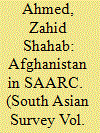

|
|
|
|
|
| Summary/Abstract |
Ever since the formation of the South Asian Association for Regional Cooperation
(SAARC) in 1985, the motivation for the expansion of the Association has been
expressed by its founding members. The prospective expansion comes naturally
to international organisations (IOs), visible in the increase in membership of
the European Union (EU) from six to 28 European countries. Similarly, the
Association of Southeast Asian Nations (ASEAN) has doubled its membership
since its inception. SAARC membership grew in 2007, with the inclusion of
Afghanistan. Yet, there is limited assessment on the opportunities and challenges
that have arisen since Afghanistan’s arrival in SAARC 10 years ago. This article
provides an evaluation of Afghanistan within SAARC, and a further comparison
to processes of enlargement in the EU and ASEAN. It is argued that Afghanistan’s
membership poses significant challenges for SAARC, owing to its political instability.
Its stature as a war-torn country has meant that it has failed to prioritise its role
in the Association. Furthermore, the membership of Afghanistan has significantly
contributed to the conflict relationship between Afghanistan and Pakistan, further
constraining SAARC processes and agendas.
|
|
|
|
|
|
|
|
|
|
|
|
|
|
|
|
| 2 |
ID:
102759
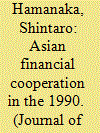

|
|
|
| 3 |
ID:
171922
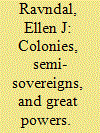

|
|
|
|
|
| Summary/Abstract |
How did the transition from a world of empire to a global international system organised around the sovereign state play out? This article traces the transition over the past two centuries through an examination of membership debates in two prominent intergovernmental organisations (IGOs). IGOs are sites of contestation that play a role in the constitution of the international system. Discussions within IGOs reflect and shape broader international norms, and are one mechanism through which the international system determines questions of membership and attendant rights and obligations. The article reveals that IGO membership policies during this period reflected different compromises between the three competing principles of great power privilege, the ‘standard of civilisation’, and universal sovereign equality. The article contributes to Global IR as it confirms that non-Western agency was crucial in bringing about this transition. States in Africa, Asia, and Latin America championed the adoption of the sovereignty criterion. In this, paradoxically, one of the core constitutional norms of the ‘European’ international system – the principle of sovereign equality – was realised at the hands of non-European actors.
|
|
|
|
|
|
|
|
|
|
|
|
|
|
|
|
| 4 |
ID:
090882
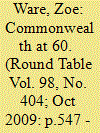

|
|
|
|
|
| Publication |
2009.
|
| Summary/Abstract |
This article offers some thoughts about the Commonwealth in its 60th anniversary year by a young observer from the 'new generation'. It argues that the Commonwealth must pay particular attention to creating a positive first impression on young people, so that it can be defined through the relevance of its current actions rather than through history books. It suggests that, in a crowded international marketplace, the Commonwealth must identify a Unique Selling Point that will be of long-term value to its members, and prove that it can do things and reach places that other international associations cannot. Its shared commitments and values give the Commonwealth the potential to be a true voice of moral authority on the world stage. Yet until the Commonwealth can truly be defined by its Harare principles, rather than with reference to the historical bonds that originally threw it together, it will struggle to transcend the inaccurate image which young people hold of it. The article concludes by looking forward to the global challenges, questions of membership and expansion, and the sensitive issue of Headship that the Commonwealth will be faced with before its 100th birthday.
|
|
|
|
|
|
|
|
|
|
|
|
|
|
|
|
| 5 |
ID:
116326
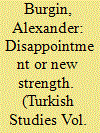

|
|
|
|
|
| Publication |
2012.
|
| Summary/Abstract |
Is the decline of Turkish public support for the European Union (EU) membership better explained by a disappointment about the EU approach to Turkey or by the new self-confidence of the country? This question is relevant because frustration about the accession process could be overcome with more positive signals from the EU. However, if the second factor plays a significant role, this would be an indicator for an enduring alienation between Turks and the EU. This article presents the results of an exploratory study based on an online survey and personal interviews. For one-third of the 618 respondents to the survey, the most important reason for waning EU support is the new strength of Turkey as a rising regional power. In contrast, the interviewed parliamentarians and local party officials consider Turkey's proactive foreign policy approach in its Eastern neighborhood as a complementary and not alternative strategy to Turkey's EU accession.
|
|
|
|
|
|
|
|
|
|
|
|
|
|
|
|
| 6 |
ID:
081299
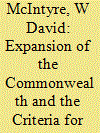

|
|
|
|
|
| Publication |
2008.
|
| Summary/Abstract |
Have they opened the floodgates? This question was being asked after the Kampala CHOGM agreed to receive applications for membership of the Commonwealth from countries that had never been British colonies. After more than a decade of uncertainty about this issue - ever since Mozambique joined in 1995 as an exceptional case - Heads of Government at Kampala approved the Report of the Committee on Commonwealth Membership finally agreeing to entertain further such applications and providing a procedure for handling them. Comment on this decision has been muted and ambiguous and usually focuses on one or other of the known new aspirants, such as Rwanda, Yemen and Algeria, rather than the general principles that should govern criteria for membership or the long term shape of the Commonwealth. The purpose of this article is to review the whole history of the expansion of the Commonwealth and consider how the issue of criteria has been resolved.
|
|
|
|
|
|
|
|
|
|
|
|
|
|
|
|
| 7 |
ID:
177892
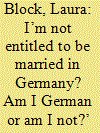

|
|
|
|
|
| Summary/Abstract |
The state interferes with the intimate spheres of families and couples via family migration policies, which have grown increasingly restrictive in many European countries. Mixed-status couples engaging in spousal migration develop coping strategies in order to adapt to hurdles and overcome them. This article explores the under-researched perspectives of sponsor spouses on (family) migration policies. When interacting with authorities, politicians or counselling services, the sponsors often react discursively, using arguments relating to human rights, citizenship, membership as well as gender and marriage/family norms. Based on a qualitative analysis of case dossiers of a German NGO counselling mixed-status couples, the article explores the narratives and strategies developed by the (mostly White) German citizen sponsors, thereby analysing the ways they ‘perform citizenship’ at the crossroads of migration control, marriage and family norms, and membership.
|
|
|
|
|
|
|
|
|
|
|
|
|
|
|
|
| 8 |
ID:
075257
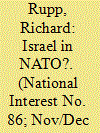

|
|
|
|
|
| Publication |
2006.
|
| Summary/Abstract |
Such a proposal brings as many complications as it does benefits.
|
|
|
|
|
|
|
|
|
|
|
|
|
|
|
|
| 9 |
ID:
145033
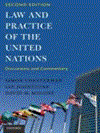

|
|
|
|
|
| Edition |
2nd ed.
|
| Publication |
New Delhi, Oxford University Press, 2016.
|
| Description |
xliii, 741p.pbk
|
| Standard Number |
9780199399499
|
|
|
|
|
|
|
|
|
|
|
|
Copies: C:1/I:0,R:0,Q:0
Circulation
| Accession# | Call# | Current Location | Status | Policy | Location |
| 058661 | 341.23/CHE 058661 | Main | On Shelf | General | |
|
|
|
|
| 10 |
ID:
127075
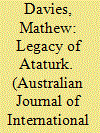

|
|
|
|
|
| Publication |
2013.
|
| Summary/Abstract |
There exists a significant and sustained difference between the ability of the European Union to successfully socialise those member states who have joined since the fall of Communism, and its apparent inability to similarly socialise Turkey. Despite some impressive legal and constitutional reforms since 2001, a key shortcoming remains, the unwillingness of many in the Turkish judiciary to implement those revised standards in a consistent way. Existing explanatory accounts of this inability would focus on the credibility of the Union offer of membership, the duration of negotiations or the importance of Turkish domestic standards. None of these, however, are able to account for why Turkey seems to occupy a half way position, exhibiting reformed laws but unreformed legal practice. To address this shortcoming this article shall combine existing scholarship on the importance of domestic normative contestation within Turkey with an appraisal of the shortcomings of the Union's conditionality policy itself that emerge from the conceptual studies of conditionality.
|
|
|
|
|
|
|
|
|
|
|
|
|
|
|
|
| 11 |
ID:
127073
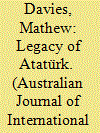

|
|
|
|
|
| Summary/Abstract |
There exists a significant and sustained difference between the ability of the European Union to successfully socialise those member states who have joined since the fall of Communism, and its apparent inability to similarly socialise Turkey. Despite some impressive legal and constitutional reforms since 2001, a key shortcoming remains, the unwillingness of many in the Turkish judiciary to implement those revised standards in a consistent way. Existing explanatory accounts of this inability would focus on the credibility of the Union offer of membership, the duration of negotiations or the importance of Turkish domestic standards. None of these, however, are able to account for why Turkey seems to occupy a half way position, exhibiting reformed laws but unreformed legal practice. To address this shortcoming this article shall combine existing scholarship on the importance of domestic normative contestation within Turkey with an appraisal of the shortcomings of the Union's conditionality policy itself that emerge from the conceptual studies of conditionality.
|
|
|
|
|
|
|
|
|
|
|
|
|
|
|
|
| 12 |
ID:
080701
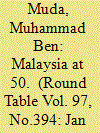

|
|
|
|
|
| Publication |
2008.
|
| Summary/Abstract |
The Commonwealth has had a central place in Malaya's foreign policy, especially in the period immediately after independence. This was, in part, due to its then current requirement for assistance with its external defence. In addition, there were no regional organizations in Southeast Asia whose purpose and objectives were centrally relevant to Malaysia's experience and national goals. The later emergence of ASEAN, OIC, or other similar bodies, has led to some erosion of Malaysia's profound attachment to the Commonwealth. This is not to suggest that Malaysia has entirely abandoned its support for the Commonwealth's existence. Generally, nowadays it prefers to play a quiet and supporting role in the organization. But Malaysia's leaders believe that the Commonwealth still has a role to play in helping to promote Malaysia's foreign and economic policy objectives, even though it may be relegated to a fourth place in the list of international instrumentalities
|
|
|
|
|
|
|
|
|
|
|
|
|
|
|
|
| 13 |
ID:
130930
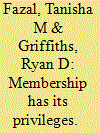

|
|
|
|
|
| Publication |
2014.
|
| Summary/Abstract |
We argue that system-level international changes have made secessionism more attractive since 1945, and that this is one of the reasons for the recent Proliferation of Aspiring States. Using original data on secessionist movements between 1816 and 2011, we document that secessionism became significantly more common after 1945. Whereas much of the existing literature explains secessionism by pointing to local or unit-level factors, we contend that security, economic, and normative changes at the international level have effectively increased the benefits of independence, without a commensurate increase in the costs. We use interviews with representatives of new states, secessionist groups, and international organizations to provide empirical support for these claims. We conclude by considering three extensions of our argument: (i) Does the nature of the changing international environment affect the way in which secessionists attempt to achieve their goals? (ii) What future changes might amplify or depress this trend? (iii) Who are the specific people benefiting from statehood, and can their position within a would-be state help us understand the nature of secessionism today?
|
|
|
|
|
|
|
|
|
|
|
|
|
|
|
|
| 14 |
ID:
193109
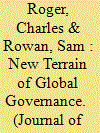

|
|
|
|
|
| Summary/Abstract |
We present a new dataset of membership in informal international organizations—IOs founded with non-binding instruments—which constitute one-third of operating IOs. We introduce state-IO-year–level membership data for 195 countries that complements the dataset on formal IOs from the Correlates of War Project. We explain our conceptualization of an informal IO, contrast it with other approaches, and detail the data collection process. We illustrate similarities and differences across formal and informal IOs, and across states and regions. We explain how our data validate or challenge conjectures about informal cooperation that have been inaccessible for lack of data. We demonstrate that while formal and informal IOs are similar in size, the composition of informal memberships in informal IOs is more fragmented. While informal IOs are a growing part of the governance portfolios of most states, some countries and regions participate more. We conclude by outlining elements of the research program our dataset unlocks.
|
|
|
|
|
|
|
|
|
|
|
|
|
|
|
|
| 15 |
ID:
115720
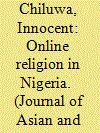

|
|
|
|
|
| Publication |
2012.
|
| Summary/Abstract |
This study examines the use of the Internet and computer-mediated communication for Christian worship in Nigeria. The seven largest and fastest growing churches in Nigeria are selected for the study, highlighting the benefits and dangers associated with online worship. The utilization of the Internet to disseminate the Christian message and attract membership across the world, and the dissemination of religious tenets and fellowship online, have resulted in the emergence of the 'Internet church' for members who worship online in addition to belonging to a local church. Most interesting is the increasing widespread claim of spiritual experience or 'miracles' through digital worship. However, there is fear that online worship endangers the offline house fellowship system, which is viewed as the reproductive organ of the local offline church. Exclusive online worshippers are also said to be susceptible to deception and divided loyalty.
|
|
|
|
|
|
|
|
|
|
|
|
|
|
|
|
| 16 |
ID:
151616
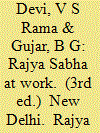

|
|
|
|
|
| Edition |
3rd ed.
|
| Publication |
New Delhi, Rajya Sabha, 2017.
|
| Description |
xlii, 1094p.hbk
|
| Summary/Abstract |
Editor: Shumsher K Sheriff
|
|
|
|
|
|
|
|
|
|
|
|
Copies: C:1/I:0,R:0,Q:0
Circulation
| Accession# | Call# | Current Location | Status | Policy | Location |
| 058956 | 324.220954/DEV 058956 | Main | On Shelf | General | |
|
|
|
|
| 17 |
ID:
192173
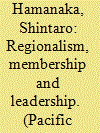

|
|
|
|
|
| Summary/Abstract |
Drawing inspiration from a Chinese proberb, this paper offers an alternative interpretation of regionalism, with a special reference to its membership. This alternative interpretation provides insights into the exclusionary aspect of regionalism, for which mainstream international relations theories lack a certain efficacy in providing plausible explanations. We hypothesize that a state forms a regional group in which it can be a leader, excluding states that are more powerful than it is. A state values the leading position in a regional group, even in a small regional group. To test the hypothesis, this paper investigates regionalism launched in Asia during the second half of 20th century, with special attention to the inclusion and exclusion of the US. By analyzing diplomatic records obtained at four national archives (Australia, Japan, the UK, and the US), as well as memoirs by retired officials and other studies, this paper shows that regionalism in Asia was often pursued in an exclusionary manner, mainly by Japan, and to a lesser degree by Indonesia. The paper also discusses whether and how regionalism in Europe can be explained with this alternative theory.
|
|
|
|
|
|
|
|
|
|
|
|
|
|
|
|
|
|
|
|
|